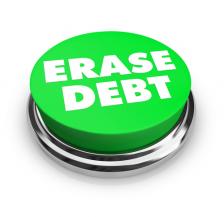Should You Pay Down Debt Early?
Find out what you should do with your extra money.
Laura Adams, MBA
Listen
Should You Pay Down Debt Early?
When you’re trying to decide whether you should send extra payments to pay off your debt—like student loans, auto loans, credit cards, and mortgages—it can be really confusing to know whether doing that will get you ahead financially. In this article I’ll make it easy for you to know where you should put your extra money by giving you three money questions to answer and three online resources.
Money Question #1: Do You Have Dangerous Debts?

In my new book, Money Girl’s Smart Moves to Grow Rich, I give you lots of advice about managing debt. An important point I cover is that your first financial priority should always be to pay off any dangerous debt like delinquent taxes, overdue child support payments, or a judgment from a collections agency. Those types of debts are very serious because they can result in garnishment of your wages or having to serve jail time. Surprisingly, some people ignore them until it’s just too late.
Money Question #2: Do You Have Enough Cash on Hand?
If you don’t have any dangerous debt looming over you, the next consideration is whether you have enough savings to get you through a financial crisis. You’re probably tired of hearing that, but having cash reserves is the only way you’ll make it through a rough financial patch without having to make expensive credit card charges or taking out a loan.
Losing your job or having a big unexpected expense could make you wish you never sent your spare cash to a lender. So before you ever consider parting with your excess money, be sure you’ve established an emergency fund at an FDIC-insured bank that’s equal to least three months’ worth of your living expenses—and ideally, even more than that.
Money Question #3: Do You Invest for the Future?
Investing for the future is a critical part of your overall financial health, so you’ll need to consider whether your excess money should be invested instead of going toward debt ahead of schedule. Here’s a quick and dirty tip: If you can invest and earn more after taxes than the after-tax interest rate you pay on a debt, you’ll be better off using your extra money to invest.
Here’s an example: Let’s say your student loan has an annual interest rate of 5%—but with the tax deduction you receive for the interest, your after-tax rate is just 4%. If you could invest your extra money in a fund inside a Roth IRA that’s demonstrated an average after-tax return of 7% over the past decade, you’d be wise to invest your extra money. Getting a 7% return is better than saving 4% by paying down your student loan early. However, remember that investments always come with some amount of risk because they’re not guaranteed.
How to Calculate Whether You Should Pay Debt Early
[[AdMiddle]The wider the gap between the after-tax interest rates you’re comparing, the more certain you should be about the decision. For instance, paying off a 16% credit card debt should always come before investing because it’s highly unlikely that you could ever find a reliable investment that would earn more than 16%.
When in doubt about whether you should pay a debt down early, turn to one of the following online calculators for help:
-
Wachovia Debt Analyzer
These calculators will crunch all the numbers so you know your after-tax interest rates for the loans or investments you’re comparing and know exactly what to do.
Download FREE chapters of Money Girl’s Smart Moves to Grow Rich
If you like these tips, I think you’ll like my award-winning new book Money Girl’s Smart Moves to Grow Rich. It tells you what you need to know about money without bogging you down with what you don’t. It’s available at your favorite book store in print or as an e-book for your Kindle, Nook, iPad, PC, Mac, or smart phone. We’re even giving away two free chapters from the book for you to sample at SmartMovesToGrowRich.com!
Win Free Personal Finance Books by Connecting With Money Girl!
To celebrate financial independence this July 4th, I’m giving away a stack of new personal finance books! If you connect with me on Facebook, on Twitter, and now on the new Money Girl Personal Finance Group on LinkedIn you’ll automatically be entered in each drawing. So follow me on all 3 networks to triple your chances. Several prizes will be signed copies of my book and the rest will be great books from other personal finance authors.
More Resources:
Pay Down Debt or Invest Calculator for Windows
Should I Pay Off Debt or Invest? Calculator
Wachovia Debt Analyzer
Betterment LLC is an SEC Registered Investment Advisor. Brokerage services offered by Betterment Securities, an SEC registered broker-dealer and member FINRA/SIPC.
Investments: Not FDIC Insured • No Bank Guarantee • May Lose Value
Investing in securities involves risks, and there is always the potential of losing money when you invest in securities.
Before investing, consider your investment objectives and Betterment’s charges and expenses.
Not an offer, solicitation of an offer, or advice to buy or sell securities in jurisdictions where Betterment and Betterment Securities are not registered.
Image courtesy of Shutterstock

